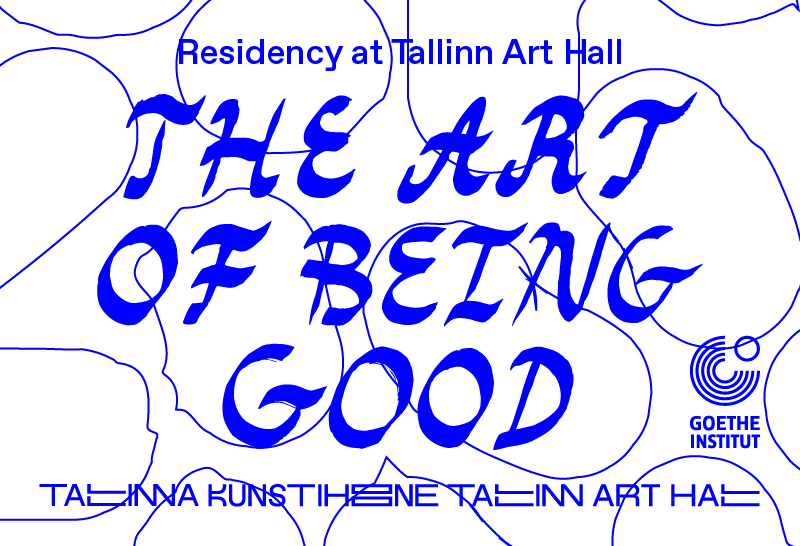OPEN CALL: The Art of Being Good
Residency at Tallinn Art Hall

From September 4 to October 30, 2022 Tallinn Art Hall and Goethe-Institut Estland will host a residency in Tallinn for artists living in Germany. This programme offers accommodation in Tallinn for eight weeks, as well as reimbursement of travel costs and a stipend.
The aim of the residency programme is to spur artistic research and discourse on the topics of ecological awareness, environmental sustainability and the ethics of making art. Although tackling the ecological, social and economic components of the crisis is common in art, artworks and exhibitions rarely direct attention towards their own role in the ruinous sequence of events. We are therefore especially interested in artists whose work advocates awareness, innovation, or revolution towards a better relationship between our planet, humans and non-human beings. The residency complements Tallinn Art Hall’s ongoing exhibition series which pays special attention both to the possibility of being good and to ecological responsibility in conditions of certain destruction. Previous exhibitions in the series have been The Art of Being Good in 2019 and Pine-fulness in 2021.
The artist in residence is provided time and space to develop an independent project. The artist may conduct research or writing pertinent to their interests. During the residency, the artist is also invited to organise or participate in at least two public events at Tallinn Art Hall, e.g. a talk, presentation, workshop, walk etc.
By the period of the residency Tallinn Art Hall will have already moved to its temporary premises in the suburb of Lasnamäe while its historical building in the city centre is being renovated. Lasnamäe was mostly built from the 1970s to the 1990s. The 5- to 16-storied panel houses of the district are contrasted by vast wild areas. It is the most populated district in Tallinn, with mainly Russian-speaking residents. The programme of the Art Hall during this time will be a mixture of site-specific and ongoing projects. The potential artist in residence is invited but not obliged to take this location into consideration when planning their activities.
The residency programme offers the following:
– On-site accommodation and studio (studio-apartment)
– Travel expenses from and to Germany
– Scholarship allowance of 300 euros per week (incl. taxes)
– Costs of materials with a maximum amount of 350 euros (incl. VAT)
– Networking opportunities, including studio visits and meetings with professionals
– An opportunity to present an artistic project created in the context of the residency
Applications will be reviewed by a jury according to the quality of the proposal and the suitability of candidates. The jury members are:
Siim Preiman, curator at Tallinn Art Hall
Eva Schmitt, deputy head of visual arts division at Goethe-Institut
Sandra Kosorotova, artist
Tanel Rander, writer, artist and curator
Franziska Nori, director of Frankfurter Kunstverein
Deadline for submissions: March 15, 2022. All applicants will be contacted at the end of April 2022.
The applicants must mainly work and live in Germany. Please provide an application in English as a single Word or PDF document (no multiple documents) with:
– Cover letter including specific project idea for the residency linked to the topics mentioned above and contact details (one page)
– CV (two pages)
– Summary of previous projects (three pages, images included)
Optionally you can include:
– Reference letter
– Writing sample (in case your artistic work includes forms of text)
Please send your PDF file by email to madli@kunstihoone.ee (subject line: Artist in Residence).
Queries may be sent to the same email address. Please note any travel restrictions due to Covid-19 when submitting your application.
The Tallinn Art Hall Foundation is a contemporary art institution established in 1934 with an exhibition programme in three galleries on the central square of Tallinn – the Tallinn Art Hall, the Art Hall Gallery and the nearby City Gallery. Tallinn Art Hall addresses the most pressing issues in contemporary art and society, provides a fascinating programme for contemporary audiences and helps artists create new exhibitions and works. We are part of the larger international contemporary art scene and mediate an active exchange of ideas between local and international art scenes and audiences. In addition, we also organise exhibitions abroad. When putting together our program we value being contemporary, international, well-curated, and engaging different generations.
The Goethe-Institut is the cultural institute of the Federal Republic of Germany with a global reach. We promote knowledge of the German language abroad and foster international cultural cooperation. We convey a comprehensive image of Germany by providing information about cultural, social and political life in our nation. Our cultural and educational programmes encourage intercultural dialogue and enable cultural involvement. They strengthen the development of structures in civil society and foster worldwide mobility.



